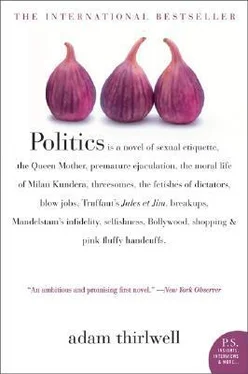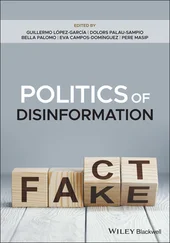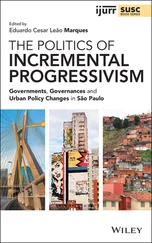Adam Thirlwell - Politics
Здесь есть возможность читать онлайн «Adam Thirlwell - Politics» весь текст электронной книги совершенно бесплатно (целиком полную версию без сокращений). В некоторых случаях можно слушать аудио, скачать через торрент в формате fb2 и присутствует краткое содержание. Год выпуска: 2004, Издательство: Harper Perennial, Жанр: Современная проза, на английском языке. Описание произведения, (предисловие) а так же отзывы посетителей доступны на портале библиотеки ЛибКат.
- Название:Politics
- Автор:
- Издательство:Harper Perennial
- Жанр:
- Год:2004
- ISBN:нет данных
- Рейтинг книги:3 / 5. Голосов: 1
-
Избранное:Добавить в избранное
- Отзывы:
-
Ваша оценка:
- 60
- 1
- 2
- 3
- 4
- 5
Politics: краткое содержание, описание и аннотация
Предлагаем к чтению аннотацию, описание, краткое содержание или предисловие (зависит от того, что написал сам автор книги «Politics»). Если вы не нашли необходимую информацию о книге — напишите в комментариях, мы постараемся отыскать её.
Moshe loves Nana. But love can be difficult — especially if you want to be kind. And Moshe and Nana want to be kind to someone else.
They want to be kind to their best friend, Anjali.
Politics
Politics — читать онлайн бесплатно полную книгу (весь текст) целиком
Ниже представлен текст книги, разбитый по страницам. Система сохранения места последней прочитанной страницы, позволяет с удобством читать онлайн бесплатно книгу «Politics», без необходимости каждый раз заново искать на чём Вы остановились. Поставьте закладку, и сможете в любой момент перейти на страницу, на которой закончили чтение.
Интервал:
Закладка:
That was why Moshe and Anjali were still together. Those were the reasons for not discussing the oddness of their relationship.
And I think there was something else too. Although Moshe and Anjali had not been happy in the menage, in fact they had been very disconsolate, that is no reason why they might not be happy as a couple. Feelings can change very quickly in a new situation. For example, I think that it is natural for two people, who have suddenly become a couple, to think that it could work out. It is natural for them to be hopeful.
People have an instinct to normalise. They are naturally optimistic, I think.
And they were both optimistic, Anjali and Moshe. After all, they liked each other. So it was possible, they thought, in secret, that they could be a couple. It was unlikely, but it was possible.
But why was this a sex scene?
Because while I have been explaining what Moshe and Anjali were feeling, they have been touching each other, quietly.
12
A week or two later, Nana and Moshe were walking up Hatton Garden, in the rain. Hatton Garden is the jewellery street in London. It is also a very Jewish street. And this is, obviously, coincidental. I rather hate Snoop Doggy Dogg, who argued once for the philological jew in jewellery. The jew in jewellery is just a phonetic coincidence.
On Jewish Hatton Garden, however, it is true that Moshe was talking about his Jewishness.
While Nana and Moshe walked in the rain, Moshe chatted about the Orthodox Jews, who were sheltering in their wide-brimmed black hats underneath plastic awnings. He just adored these Hasidim, said Moshe. He loved everything about them. He loved their podginess, and the curls dangling round their ears. They had their own sweet style. Moshe appreciated the style with which their trousers flapped above their black ribbed polyester socks. Or the way their kapels were clipped to the one tuft of hair on their heads. Yes he loved this, said Moshe, feeling sad.
I hope you are appreciating how good Moshe is being. He is being very polite. He is being a model ex-boyfriend.
Because although Moshe was feeling sad, he was also being charming. It was a socially difficult moment — spending the day with his ex, while still going out with her other ex. That was finicky enough. And also Nana’s father was possibly dying. Therefore, thought Moshe, it was not an ideal day. But Moshe was not a bad person, he was not a selfish person. Because it was socially difficult, Moshe was chatty. He was chatty and very charming.
Moshe said, ‘Shall we find somewhere indoors to eat?’ And Nana nodded because she was a girl habitually unprepared — in a white Boden shirt in January. So indoors sounded adorable.
Moshe had an idea of somewhere to eat. It was not an innocent question. He was going to take Nana to the Kosher Knosherie.
So they moseyed wetly to the Kosher Knosherie, on Greville Street.
Outside the Kosher Knosherie, the Kosher Knosherie black cab — for deliveries — was parked with one tyre squashed against the kerb. On the driver’s door of this cab Knosh Around the Clock was stencilled in fat purple italics. This was, Moshe assured her, the best salt beef in the city. Better, he said, than Brick Lane. It was greengrey and fatty, there on the counter, visible twenty-four hours.
They both sat down. Moshe was nervous. Nana was nervous too.
Nana lifted her damp shirt away from her bra’s lace foliage. Moshe said that he adored this place.
I do not want you to think that Moshe had suddenly converted. It was not that, in the aftermath of his break-up with Nana, he had found Jehovah. No, he had not become frum in any way. Moshe’s relationship to the Jewish race and faith was, as always, purely emotional. The Kosher Knosherie made him feel emotional. Now that he was sad, it made him happy. It made him believe that he liked salt beef. On the occasional moments when he tore strips of salt beef from a bagel in the Kosher Knosherie, Moshe felt a kinship with Jewish City Boy East End Cool.
A man with strawberry-blond fur on his ears was buying a cream-cheese bagel. ‘Bu my favrite, always was, was Stanley Matthews,’ he said, opening out the door and holding it. ‘Yeah,’ replied the man behind the counter. The man behind the counter was trying to fit a plastic lid on a cardboard cup of coffee. ‘Nonev that hugging,’ said the man, closing the door again, pointing with the fist of his scrunched bagel bag. ‘He’d just score a goal and shake hands, tap on the shoulders, then he’d run back.’
Moshe looked at the menu. He looked at Nana. He said, ‘I’ve, I’ve.’ He said, ‘We’ve missed you. We’ve both missed you.’ Nana said, ‘I’ve missed you too.’ Moshe said, ‘I do still love you. You know. I still love you.’ And Nana said, ‘I know.’ Moshe said, ‘Do you remember that time you were helping me learn my lines for what was it, Noel Coward? That was the funniest time we ever had.’
I don’t think this was tangential. It might seem that way, but it wasn’t. Moshe was in love with Nana. He wanted her to feel nostalgic. He wanted her to miss him too.
Nana said, ‘What was it you were doing next?’ Moshe said, ‘Me? Me, oh. Oh nothing. I’ve got a bunch of meetings next week. But Anjli’s got something on. She’s got another advert for someone. I can’t remember now. But it was going to pay, it was going to pay pretty well.’
Nana nodded.
Moshe said, ‘And how’s, how’s your father?’ Nana said, ‘Oh. Oh he’s okay. Okayish. I mean his taste is weird. He can’t taste anything extreme, he can’t do curry. But just everything in the mid-range. Although he still can’t tell the difference between lemon and lime.’ Moshe said, ‘Uhhuh.’ And this was not an ‘uhhuh’ of boredom, I don’t want you to get that idea. It was an ‘uhhuh’ of worry. Nana said, ‘You know what came back first?’ ‘What?’ he said. ‘Squid,’ said Nana. ‘Squid?’ said Moshe. ‘He had this really good squid and he tasted that. It came back after a cold,’ said Nana. ‘He said he’d got a cold and couldn’t taste anything and when it went his taste came back better than before. I mean why’s that?’
Moshe said, ‘Nana. Nana sweetie. I have no idea.’
Moshe picked up the menu. This action was there to distract from or disguise his next lines. He said, ‘I think it might be okay, me and Anjli. I mean. It’s odd without you. It’s sad. But I don know. We might, maybe we’ll do it.’
Now, I am a little surprised that Moshe said this. If he wanted to get Nana back, then it was not really sensible, telling Nana that Moshe and Anjali could be happy. But I think I can see Moshe’s misguided rationale. It was, after all, true in a way, and it gave him the chance to be polite. He was trying not to make this trip to the Kosher Knosherie difficult for Nana. So Moshe wanted to seem calm.
But also, I reckon, it made Moshe happy — telling Nana that she had not destroyed him. It was a tiny polite moment of revenge.
And it was a revenge. Nana was fond of Moshe. She was more than fond of him. It was difficult, being this noble. She did not like living apart from Moshe. She was jealous of Moshe and Anjali. She did not want to think that they might end up happy together.
Nana nodded.
She looked round. A man beside her was doodling with ketchup on his chips. On the walls, there were massive jigsaws like murals. To Nana’s right, there was Hieronymus Bosch’s Temptation of St Anthony. This was indicated underneath in three different languages, each written in a trompe l’ il parchment scroll. ‘Temptation of Saint Anthony — Tentation de Saint Antoine — La Tentazione di Antonio’. Beside the jigsaw, there was a label -
“The Worlds” largest jigsaw over 16,000 pieces — and on her left there was another jigsaw. It was a lake view. Nana wondered if Israel had any lakes. She wondered if this lake was in Israel. She looked at the plastic menu with maroon varnished leather trim. They had paper- clipped on to the menu a photocopy of an Evening Standard round-up of the best salt beef. Nana ordered a bagel and a poached egg. Moshe ordered salt beef.
Читать дальшеИнтервал:
Закладка:
Похожие книги на «Politics»
Представляем Вашему вниманию похожие книги на «Politics» списком для выбора. Мы отобрали схожую по названию и смыслу литературу в надежде предоставить читателям больше вариантов отыскать новые, интересные, ещё непрочитанные произведения.
Обсуждение, отзывы о книге «Politics» и просто собственные мнения читателей. Оставьте ваши комментарии, напишите, что Вы думаете о произведении, его смысле или главных героях. Укажите что конкретно понравилось, а что нет, и почему Вы так считаете.












